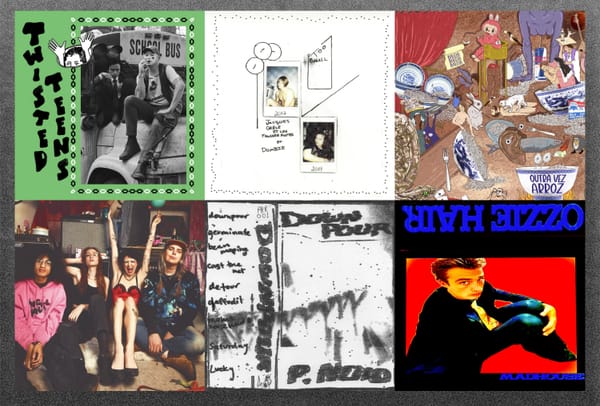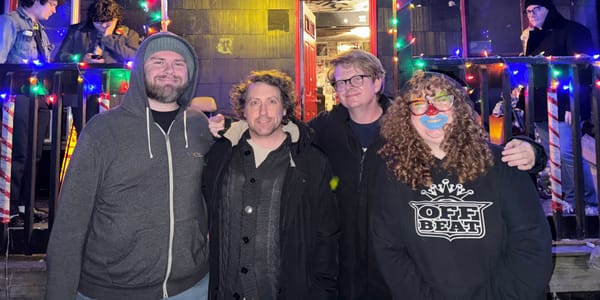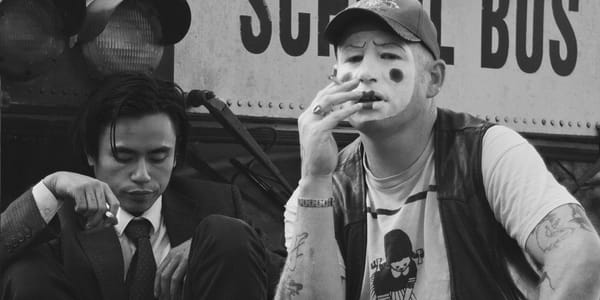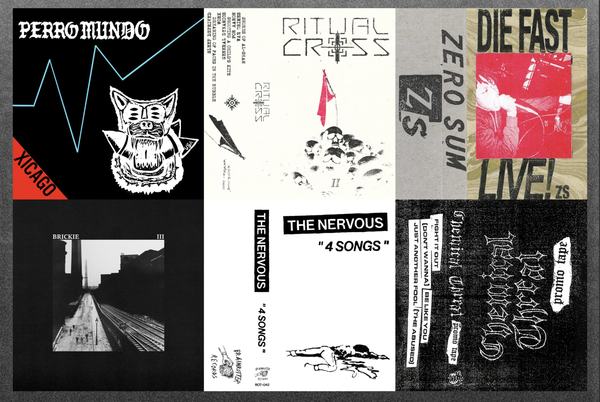evinspragg’s synth punk soliloquies will outlast the egg war
Milwaukee’s Eric Mayer was hashing out some inner thoughts through songwriting. He didn’t know the album notes would be the spark for the egg punk discourse.
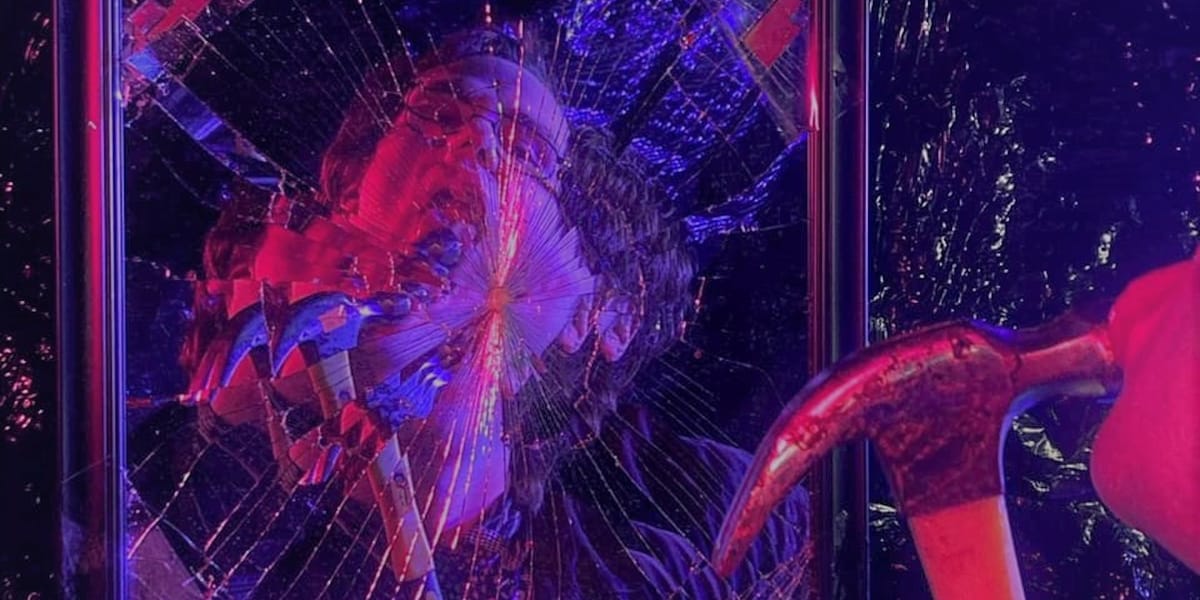
Evinspragg’s newest album begins with the mosquito din of a menacing synthesizer before bursting into Eric Mayer’s (Tenement, Obsess Tact) first soliloquy on The Neo Forms of Soliloquy in which he asserts “isolation breeds neurotic tendencies.” Partially crafted in the early phase of the COVID-19 pandemic, the record dives deep into the interior brain lake and bursts to the surface with revelations delivered in an impressive number of words per capita. It’s synth punk dunked into ’80s hardcore with catchy bass riffs, angular guitars and pensive moodiness. The Evinspragg live band is composed of Eric on vocals, Patrick and Joe from Bad Crime on bass and guitar, Julia Blair of solo and DUSK notoriety on synths, and Jesse from Big Laugh on drums. It’s a powerful melange of characters from the Wisconsin rock universe.
But the record itself was written and performed entirely by Eric Mayer with the exception of additional vocals by Sevan Cat Ries (of Credentials). Songs like “Still Waters” float on a gentle dark river of synthesizers while “Hard to the Core” sucks you into a whirlpool of crunchy guitars and blistering drums. “I Couldn’t Care Less” crosses the six-minute threshold and feels like a chase sequence; the boogeyman chasing you is your own thoughts. The Midwest is a portal for a unique freakiness a la Devo a la Brainiac a la Cruelster, and Evinspragg exists comfortably in that canon. The Neo Forms of Soliloquy will make you dance and creepy crawl, but most of all, it’ll make you think.
“Can you be normal,” Mayer asks himself on this record, and in our conversation over Zoom on a Friday evening, normality isn’t exactly on the table. We talked about stepping out from behind the drums to the front of the stage, catching a stray during punk discourse, and processing self-perception through art.
How did this project start?
I started messing around with eight tracks, and I started to demo songs for the bands that I was in at the time. And it was also a way for me to practice recording. And then I just learned right off the bat, wow, I can actually play pretty well by myself. It wasn't like, I’m going to start a solo project. Just that it was actually pretty easy for me. Starting a solo thing was lurking in the back of my mind, but I had a deathly fear of stepping up to the microphone and projecting my voice, like hearing myself back. I'm like, There’s no way I can do that.
And then, I don’t know, the idea started to grow. I got my job back, actually, at the tofu company and there’s plenty of time to just daydream. So I started thinking about these things and then I was just like: I’m gonna do it. I’m gonna record a song. And I recorded a song and I absolutely loved it. I loved the way it turned out. I loved how I got it on, like exactly how I wanted, and then it just completely grew from there. It's even funny too, because I recently listened to those first recordings and I can tell that I’m nervous about, you know, projecting into the mic. But I left them as is because I feel like they should be that way.
Yeah, I think that having the freedom to experiment on your own is really interesting. I talked to Moses and he described a similar process of once you figure out you can do it, it's like a toy box. What was the first song you recorded?
It’s called “The Man in Pain,” which is actually inspired by a guy I was working with at the tofu factory. He was in his sixties and I just kind of idly observed him. Him being his age, he wasn’t moving around too gracefully. I’m just like, man, that guy looks like he’s in pain. Like he looks like he’s not having a good time. That’s actually what was like ruminating in my head. And I’m like, maybe I could formulate a song about that. Not like pointing my finger at him, but it was like this concept of someone who’s trying to live their life, but they’re in so much pain all the time. And it grew from there, I guess.
The original idea I had for Evinspragg was it was going to be this split personality where I was talking to myself, and that's actually kind of like the reason the concept of this new album is what it is. Initially, I was like, well, I can’t really stretch that idea farther than like a handful of songs, so I kind of scrapped it. But then I had the idea to do a few songs that way, so I thought I’d use it as the concept for this new record.
When you’re approaching lyric writing, are you writing about things that you see and processing them through your lens, or is it a mix of what you’re observing outside yourself and what you’re inwardly observing? Since some of these songs are soliloquies, do they feel more personal?
I feel like they’re personal, but I wanted to portray them in a way that could be universal. I think we all go through these kind of feelings sometimes. A few of the songs I actually wrote years ago when we were still knee deep in COVID, still unsure about what's going to come out of that. I really stuck close to the social distancing and being at home and not going anywhere. I got laid off from work for over a month, so I had a lot of time to be by myself.
I just learned these repetitions that I started to develop in that time. All these songs are kind of personal to me in that sense. But I think, like I said, they’re universal. I think we all kind of go through that sometimes. And it’s kind of like, how could I capture some sort of like pop song sensibility for these songs to where you really relate to it. Not that you have to relate to it, but it’s there if you want it.
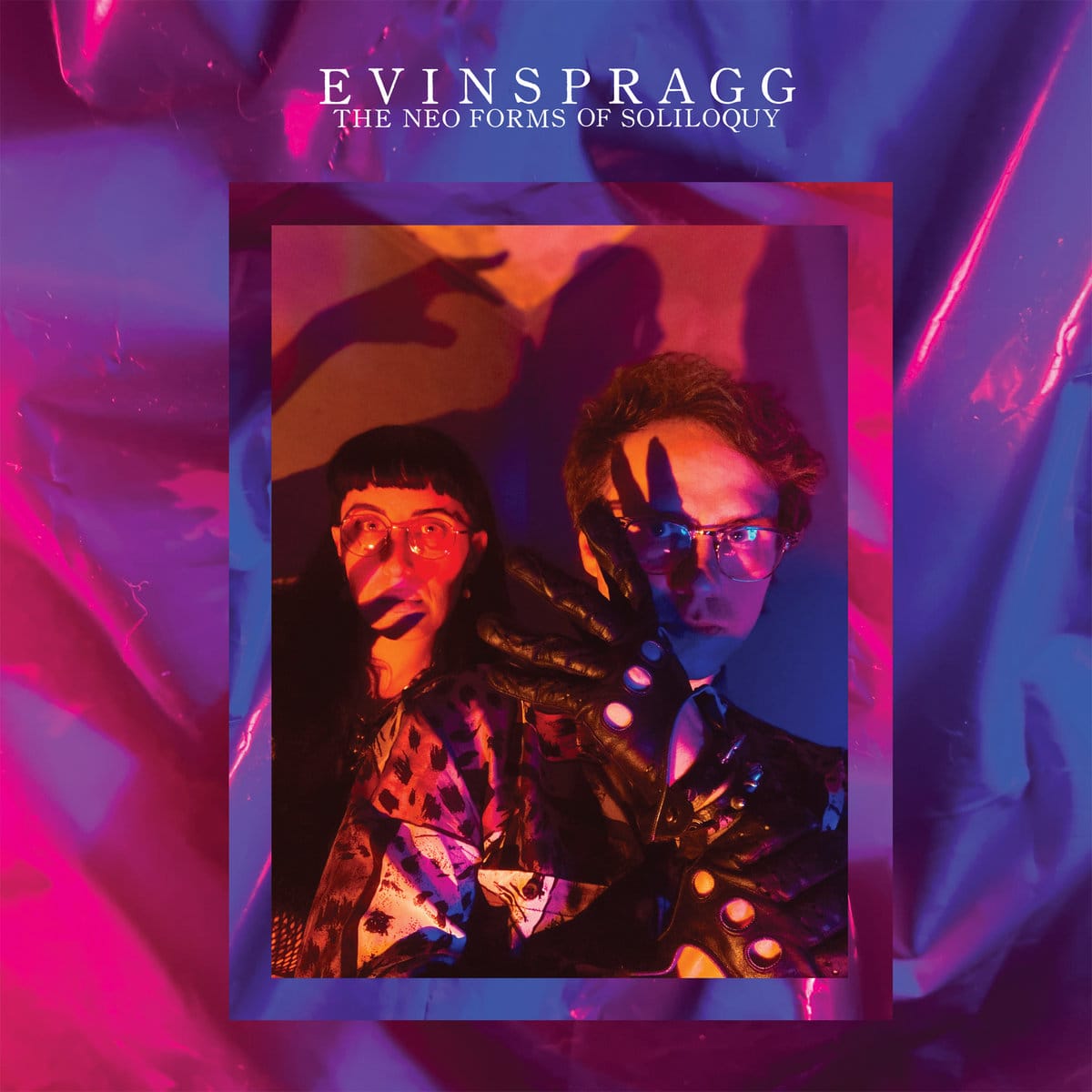
I also think something interesting about these songs and their presentation versus the last release is that this one feels more accessible. Both releases obviously have an angular sound, but this one sounds softer almost, or like the edges are more rounded than the last release. Was that intentional, given that these are kind of more like soliloquies?
That’s an interesting perspective because there’s eight songs, and the first four, they kind of go in order of how I wrote them and recorded them. The first four were recorded in September 2021, and they didn't have a lot of synth on them. So they were very angular and jagged at the time. And then I took a break from playing music just out of losing interest in it and focusing on other things. During that time, I was still very interested in finding new music and listening to new music.
I just started hearing all these little nuances in things that I was listening to—and it's funny to say because I started listening to a lot of like, Top 40 synth pop, like Duran Duran and Spandau Ballet. And they had all these little things in the underlaying of the song to carry these little things, and I was really taking note of that. So then I went back and I recorded all these synth parts, and the synth parts are meant to be kind of like synth pop. They’re not supposed to be nasty or jagged or anything like that. It’s meant to have a pleasant melody, I suppose.
It also adds a little bit of softness or levity because I do feel like you write music for the ruminators, you know what I mean?
It’s a lot of mirror reflection stuff, but it’s also observation too, like what I see people doing that reflects to myself. And it’s just like, why do I find this important to keep up with? This thought of being perceived—it’s almost kind of scary in a way. Like, why do I care about that? Like why is that important to me? Why do I need to look punk? Why do I need to do anything like that? Why can’t I just be like a normal person?
And I think I was trying to capture that in some of these songs, but that’s also the things I’m talking to myself about in general. And that’s where the concept of this record is rooted. It’s definitely me hashing out my inner thoughts and the things I’ve jotted down in that time.
It feels like there’s a distinct visual aspect to the project in its live form, so I’m curious how you’ve molded that more specifically for the live show.
Well, that’s kind of funny because when I started the project, I never intended it to be played live. So I wrote so many words and I can’t play an instrument and sing at the same time [laughs]. Like, yeah, I could practice, but I’m not gonna do that. So when I actually did get some people to be in the live band, I was just kind of like, “Listen, I don’t wanna wear jumpsuits and make it a costume, but we should dress nice.”
I think it kind of stemmed from my fascination with the way Gang of Four looked when they played. They were wearing suits, they were wearing fancy button-up shirts. They looked like they were on a business call, you know? And that was appealing to me. I think it goes over people’s heads a little bit.
You talking about Gang of Four and Duran Duran—there was a period of music where the visual was kind of a shorthand for what you maybe could expect to hear. But now that we don’t live in a monoculture, it’s like much harder and also styles don't mean anything.
Yeah, I don’t think us wearing button-up shirts would pinpoint what we’re gonna sound like but if I guess for the real heads out there? They could probably see a connection. These are the strange things I think about, and honestly, though, that’s the fun part, the conceptualizing. It’s like almost sometimes more fun for me than the actual doing it part.
And even the mention of Duran Duran. When I was a kid I never paid attention to that kind of stuff because I hated the imagery. I hated the way they looked. I’m like, but now if you look at the record cover I can put two and two together. I wanted something that’s kind of sexy, but it has a vibe to it. It’s moody. And sometimes those Duran Duran album covers are the same way. And I was kind of fascinated by that.
You’re a painter as well. What’s your approach to making album art versus how you’re approaching a painting? Is it two totally different practices or is there some crossover?
I didn’t want to do anything that was too predictable. Like the people who know me obviously know I paint, and I felt if I did a painting for the record cover, that would have been very obvious, very predictable. So what’s something I could do that might be out of left field? Not that I haven’t taken selfies before, or I mean, even the first album has a portrait of me. But what could be the next thing? So we used some lighting and some shadows and a plastic background. I was just trying to think of something I haven’t done before something that wouldn’t be too obvious.
I feel like my paintings and the music definitely coalesce, but I didn’t want them to be so smushed up together. If you were to listen to the music and never see my paintings, it wouldn’t really matter. But if you did see them, you’re like, This makes sense. Maybe. I don’t know! But that’s why art is cool, because it’s free to interpret, I suppose.
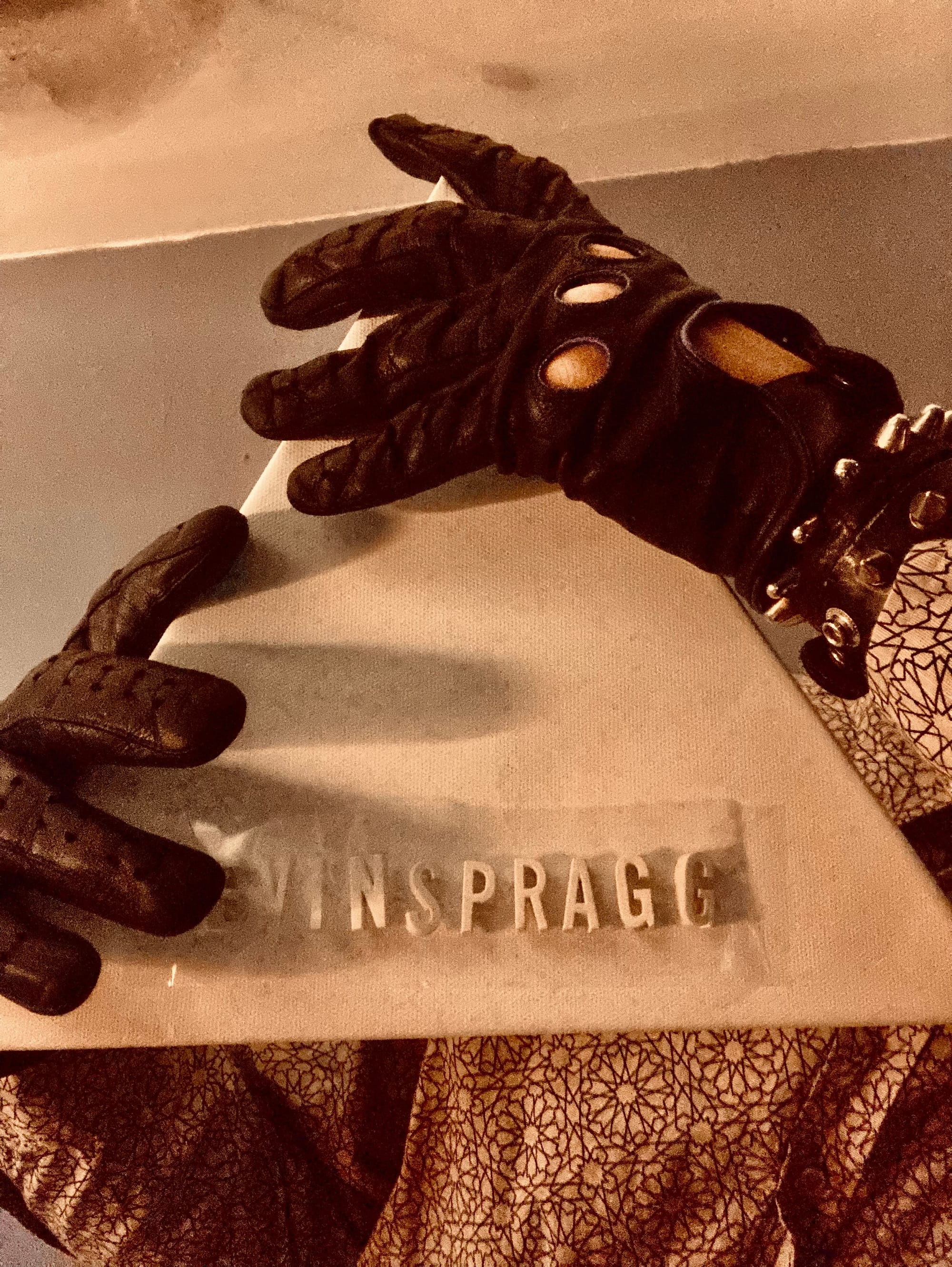
OK, I feel like I am legally obligated to ask—did it feel weird to have the album’s announcement get entangled in the egg punk eulogy discourse?
Yeah, a little bit. I was kind of like, oh, fuck, I’m totally caught. I’m an innocent bystander caught in the crossfire over this. It was never meant to be like a middle finger to anybody, and I didn’t realize that [eulogy] was going to be attached to my album blurb. So I was like, Oh, shit. I was so excited about the song finally coming out. That song’s almost four years old at this point. So excited! And then, yeah, it was just an explosion online. Like, well, I guess I’ll be pushed to the side a little bit here.
Are you planning on doing any touring for this project?
I would like to travel with it eventually. I guess my vision for it is like I’ll let it go as long as it needs to. I don’t need to keep releasing records or anything like that. We do have a few shows coming up in May, two of them are out of town, which will be our first time outside of Milwaukee, and they’re all circled around the release of the record. So I’m pretty excited about that! The other band I’m in wants to tour later this year. And it’s kind of like, well, I can only do one at a time. And I don’t want to do the two band and one tour thing.
When it comes to forming a band, I feel like it’s just easier to collaborate with people you're already collaborating with.
Well, the reason why I chose the people that are in the live band is because they have been in bands previously and they’re in a band together now. I already knew they had chemistry with each other, so there’s no awkwardness of new people meeting each other. They already know each other. They’re already synced, on the same page. It truly was that experience. I didn’t have to teach a single thing to any of them. They all came super prepared, and they all knew the songs right away and were all on the same page with each other. And it was actually something I had to step back in awe of. I was like, wow, this is actually kind of crazy. Because would I be this intense about it? I don’t know.
That's awesome. You’re like, Wow, you guys showed up more prepared than me.
Yeah, truly. were, they’re the ones pushing me to do it. And then they’re the ones in the group chat, like, “Let’s get this going!” And I’m like, “Yeah, OK.”
That’s a good team to have behind you.
I picked the best ones!

